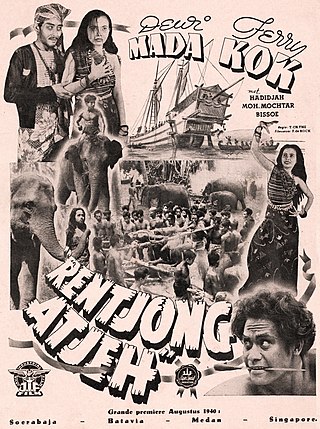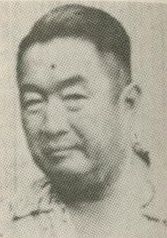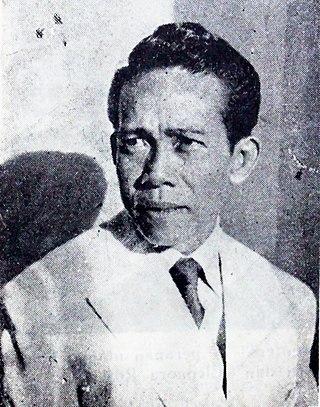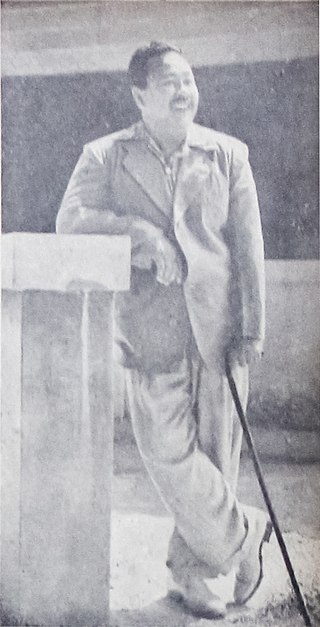
Fifi Young was an Indonesian actress of mixed French and Chinese descent who acted in at least 86 films over her 34-year career.

Kris Mataram is a 1940 film from the Dutch East Indies that was directed by Njoo Cheong Seng and starred Fifi Young and Omar Rodriga as two lovers divided by class. Young's feature film debut, the film was the first produced by Oriental Film and depended on Young's stardom as a stage actress to attract viewers. It may be a lost film.

Njoo Cheong Seng was a Chinese-Indonesian playwright and film director. Also known by the pen name Monsieur d'Amour, he wrote more than 200 short stories, novels, poems and stage plays during his career; he is also recorded as directing and/or writing eleven films. He married four times during his life and spent several years travelling throughout Southeast Asia and India with different theatre troupes. His stage plays are credited with revitalising theatre in the Indies.

Rentjong Atjeh is a 1940 action film from the Dutch East Indies directed by The Teng Chun. Telling of a group who take revenge against pirates in the Strait of Malacca, it starred Ferry Kock, Dewi Mada, Bissoe, Mohammad Mochtar, and Hadidjah. It was filmed near the shore in Batavia and reused footage from The's earlier work Alang-Alang (1939). Rentjong Atjeh, inspired in part by the Tarzan films, was a commercial success, although it may now be lost.

Djantoeng Hati is a 1941 film from the Dutch East Indies directed by Njoo Cheong Seng. A tragedy warning against modernity, it starred A. Sarosa, Rr Anggraini, and Ariati

Fred Young was an ethnic Chinese film director and producer active in the Dutch East Indies and its successor state, Indonesia. He reportedly studied film in Hollywood as a youth, but only entered the nation's film industry in 1940. After he made his debut as a writer with Sorga Palsoe, he was involved in some 36 productions, 23 as director.
Tan Tjoei Hock was an Indonesian journalist and filmmaker. Born in Batavia, he was discovered by The Teng Chun in the late 1930s. Tan became one of the most productive film directors of the Dutch East Indies between 1940 and 1941, directing nine films – primarily action.

Ratna Moetoe Manikam, also known by the title Djoela Djoeli Bintang Tiga, is a film from the Dutch East Indies.

Zoebaida is a 1940 film from the Dutch East Indies directed by Njoo Cheong Seng. A romance set in Timor, it starred Njoo's wife Fifi Young and was the film debut of Soerip. Shot over a period of 27 days in a Dutch-owned studio, the film received middling reviews. It is likely lost.

Air Mata Iboe is a 1941 drama film from the Dutch East Indies directed and written by Njoo Cheong Seng. Starring Fifi Young, Rd Ismail, Ali Sarosa, and Ali Joego, it followed a mother who raises her children lovingly but is ultimately betrayed by her eldest sons when she falls upon hard times. The film, billed as a "musical extravaganza," featured a soundtrack by R. Koesbini, and an eponymous title song written by Njoo.

Panggilan Darah is a 1941 film from the Dutch East Indies written and directed by Sutan Usman Karim and produced by Tjho Seng Han for Oriental Film. The black-and-white film starred Dhalia and Soerip as orphaned sisters trying to make a living in the colonial capital of Batavia before moving to Kudus to work at a clove cigarette factory.

Dhalia was an Indonesian actress active for over fifty years. She was nominated for three Citra Awards at the Indonesian Film Festival, winning one.

Miss Riboet's Orion, originally known as the Orion Opera, was a theatrical troupe active in the Dutch East Indies in the 1920s and early 1930s. Established by the husband and wife team Tio Tek Djien and Miss Riboet, the company travelled throughout the Indies and performed various acts, particularly those with action scenes. It was disbanded in 1942, having lost much of its popularity due to competition with Dardanella.

Anastasya Soerip was an Indonesian singer and actress.

Pantjawarna is a 1941 film from the Dutch East Indies.

Oriental Film was a film production company in Batavia, Dutch East Indies. Established by ethnic Chinese businessman Tjo Seng Han in 1940, it completed four black-and-white films before it was closed in 1941. All the company's films were screened into the 1950s but may now be lost. They were directed by two men, Njoo Cheong Seng and Sutan Usman Karim, and launched the careers of actors such as Dhalia and Soerip.

Rempo Urip was an Indonesian film director. He began his career in the theatre, serving as an extra and footballer for the Dardanella theatre company beginning in 1934. After six years and three troupes, Urip entered the film industry, working as a distributor for Oriental Film and assistant director for Java Industrial Film. He returned to the theatre during the Japanese occupation (1942–1945) and national revolution (1945–1949). In 1951 he joined Djamaluddin Malik's Persari as a director, completing thirteen films for the company before it closed in 1958. He continued as a freelance director until 1977.

S. Poniman was an Indonesian kroncong singer and comic actor. Born in Banda Aceh in 1910, he took up singing and made his way to Batavia. In 1940 he made his debut as music director and actor on the film Kedok Ketawa, completing three further productions before the Japanese occupation brought film production to a near-standstill. Poniman spent time as a soldier and truck driver before returning to the film industry in 1951, after Indonesia's independence, as a star of Dunia Gila. Between 1951 and 1958 he appeared in more than twenty films before leaving the struggling industry to become a trader. Though he appeared in several further films before his death, Poniman never regained his stardom.

Penghidoepan was a monthly Peranakan Chinese, Malay-language literary magazine published in the Dutch East Indies from 1925 to 1942. It was one of the most successful literary publications in the Indies, publishing more than 200 novels and short stories during its run. Among its authors were many of the notables of the Chinese Indonesian literary world including Njoo Cheong Seng, Tan Hong Boen, and Tan Boen Soan.

















